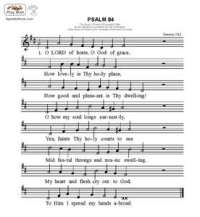"No Good Thing Does He Withhold" -- A Sermon on Psalm 84
 Tuesday, June 17, 2014 at 10:13AM
Tuesday, June 17, 2014 at 10:13AM  A Sermon on Psalm 84
A Sermon on Psalm 84
In many places, the Bible speaks of the Christian life as a pilgrimage. Paul describes the Christian life in terms of enduring this present evil age as we make our way to the glorious inheritance which is ours in the age to come (cf. Galatians 1:4, Ephesians 1:21). When our Lord Jesus calls and instructs his disciples, he uses images drawn from Israel’s Exodus from Egypt, in which Jesus promises that he will lead us from the bondage of the guilt and power of sin, into the promised land, which is our Sabbath rest in the presence of God. The Bible also tells us that we are citizens of two kingdoms–the city of man, and the heavenly kingdom. We live in the one, all the while we long for the other. When U2's Bono cries out “I still haven’t found what I’m looking for,” there’s something in us cries out right along with him. As God’s people, we long for God’s presence and favor. This is our hope and the realization of our heavenly citizenship. This gives meaning and purpose to our lives as we make our way towards our goal and final destination. The problem isn’t that we haven’t found what we are looking for–we have. The problem is that we won’t fully receive what we have found until we come to the end of our pilgrimage, and we are not there yet. This is why the biblical writers can depict the struggles of the Christian life as a journey of sorts, as we make our way to that place for which we so eagerly long.
We continue our series on select Psalms and we now take up Psalm 84 which is attributed to the Sons of Korah. This Psalm is found in the third book of the Psalter and describes a pilgrimage to city of Jerusalem to worship YHWH in his temple. Although the pilgrim motif takes many different forms in the Scriptures, one way it is depicted is in terms of a longing for fellowship with the living God. In the Old Testament we find this longing expressed by many of Israel’s prophets. During that period of redemptive history from the time of Israel’s release from captivity in Egypt to the forty years of wandering throughout the wilderness of the Sinai, the people of God long to enter the promised land of Canaan–for them a new Eden of sorts. During the era of Joshua and the Judges, and then throughout the period of the united kingdom of Saul, David, and Solomon, God’s people desire to worship God in his temple, which they see as the visible sign of YHWH’s presence in the midst of his people. But once the kingdom is divided and Israel’s fortunes become bleak, God’s people find themselves longing for deliverance from the apostasy of the people, and from the wickedness of their religious leaders. The people of Israel long for deliverance from their enemies, and for that time when Israel will once again live in peace, safety, and prosperity. It is not accidental that messianic prophecy flourishes during this time, as God’s people increasingly long for their promised Messiah.
In the New Testament, this same longing for God’s presence and his blessing takes a strikingly different form. With the coming of Jesus Christ, the biblical focus shifts away from the letter of the law written on two stone tablets, to the Holy Spirit. The focus shifts away from a building where God resides (the temple) to the church in which his Spirit indwells. It shifts away from fruitful vineyards, fields, and orchards (material blessing) toward heavenly blessings, and it shifts away from dwelling in the land in peace and safety (Canaan), to union with Jesus of Nazareth (the true Israel). As Paul puts it in Galatians 4:4, now that the fullness of time has come, Jesus stepped out of the type and shadow of the Old Testament, fulfilling all of God’s promises. With the dawn of the messianic age, it is clear that Jesus is the true Israel and that we are his people. This is why in Matthew 12:6, Jesus says of himself, “I tell you, something greater than the temple is here.”
To read the rest of this sermon, Click Here


Reader Comments